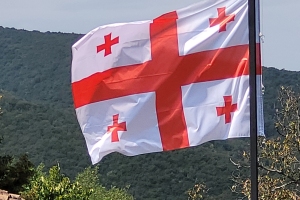
History has been a long friend of mine, a childhood friend, in fact. At about nine years old, I found a history book about the American Revolution. It was a book of Revolutionary War battles, and each battle had a painting associated with it that showed the blue American soldiers advancing in their lines facing the red-coated British soldiers opposing us. Puffs of smoke revealed the cannon firing on their enemies, and little blocks of description were worked tastefully into the painting, so you knew exactly what you were seeing. It drew me in as if through a wardrobe to a different world. The book sparked a love for history in me that has lasted all the decades since then.
Church and missions history has interested me for over 20 years, and I have learned to care a great deal for missions history. I plan to write what I hope to be a long series of posts on missions history that will inform you and encourage you to read more of it on your own. Before we get started, though, I would like to let you know what history means to me, how I approach it, and what you might expect from my best attempts to explore the complexities of history. Let’s get going.
Istoria is old English and where we most directly get our word history. This old English word most likely came, as did many words, from our Greek and Roman friends. In Greek, historia is an “inquiry, narrative, an account,” and, of course, histor is a “learned, a wise man,” hence historian. So, history is about making wise judgments and learned inquiry into the past that give us a narrative we can follow or at least an account of what happened. It seems ambitious enough for me, and I think it is critically necessary in missions than in many other areas. Let me explain.
Cross-cultural missions are about taking the transforming Gospel of Jesus Christ to new places, cultures, peoples, and the languages they communicate in, and presenting the timeless truths of God to these brand-new contexts and watching the Holy Spirit make use of that effort to glorify our Lord Jesus Christ. It is one of the messiest things we can do in this life with so many factors to contend with that the human mind fails to comprehend fully. First, our God is a living God and acts in all things as He wills, not as we wish, or even always as we can comprehend. Second, cultures are created and acted on by humans and are ever-changing. Since culture is created corporately by all the people who claim a culture, culture can also constrain our imagination, limit our choices, bind our actions, and funnel our decisions down paths we would rather not choose. The story of humans, God, and societies are the stuff of missions, as are the individual actors, but what a glorious, crazy mess it all is at times. With so many possible angles on telling the story and so many actors in the story itself, in some cases, it is not just the barriers of culture and language we are dealing with, but also the barriers of time and space. To paraphrase a famous quote,
The past is a very foreign country that can only be understood with great care. If the task is so complex, why attempt it at all?
The very protean nature of the subject means a learned inquiry, creating a narrative, and having an account is vital to all of us. When we look at the chaos of life, we need to make sense of it, grasp a narrative, learn from errors, be inspired by success, and realize we have not been the only ones to face significant challenges or difficult times. When I was on the field in Georgia, I started teaching church history to leaders coming up through the youth ministry, and I saw a strange effect repeatedly. We would be going over the persecution of believers in Japan or the war of religion in Europe, the persecution of Baptists in England, the difficulty of Circuit Riders’ families as they evangelized Americans or other such examples, and a Georgian leader would brighten up with encouragement. They realized they were not the Christians worst off in the world. Believers had faced terrible persecution, oppression, and enormous challenges, and still maintained their witness, built on their faith, and evangelized the lost. Even a bit of perspective helped the young Georgian leaders have hope; they could see God at work in challenging situations and became more open to trusting Him with their own.
By sharing bits of missions history with you on the blog, I hope we can see how God has been at work.
Through narrative, accounts, and wisdom, we can sort through the chaos, discover useful narratives, settle on some accounts, and even ask some controversial questions. We need to start somewhere, so I have chosen to do a bit of a deep dive into one place to show you the difficulties of mission history, how the big narratives, the personal accounts, and significant cultural movements create our present and have a say about our future.
In the next post, get ready for a deep dive into the mission history of Georgia.

Georgia, A History of the Baptists, Part I
Mar 10, 2025 6 min · Brian W Let's start at the beginning. People have been in Georgia for a very long time. We can just say that humans got to Georgia early and have been there a very long time. But what about modern Georgians? We… Read More
Is There a Better Way? Part I
Jan 13, 2025 4 min · Brian W The story is familiar but bears repeating. After the Reformation hit in 1517, old theology and renewed interest in the Bible, as well as faithfulness to God’s Word, swept Europe. This massive cross-cultural… Read More
History Grants Vision, Perspective, and Wisdom:
Nov 04, 2024 3 min · Brian W I love history. A big part of my discipleship was delving deep into Church history; a little later, reading a lot of missions history, too. It is too easy to find bad church history because well-intentioned… Read MoreAuthor
Brian served 14 years in the Republic of Georgia, where he started a youth ministry, discipled new leaders, and planted over 15 new churches before serving in leadership of another missions organization. Brian is married to Maia and they have two children.